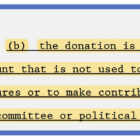Money in Politics
Lawmakers seek to close big transparency gap
|
Senate Bill 42 would add a new requirement for when outside groups can not report their donors. There were bound to be gaps in a 2019 revision to New Mexico’s dense elections transparency law that sought to force independent groups who aren’t required to register as political committees to disclose the money they spend in elections.
The changes were quickly put to the test the next year, during the 2020 election cycle, when a new independent expenditure group found a loophole so big it evaded reporting who donated hundreds of thousands of dollars it spent on political advertising.
Under the current law, if a group crosses a spending threshold for political advertising, it must report all of its donors who’ve given more than $5,000 – with one exception. If a donor puts in writing that their donation can’t be used for politics, the group isn’t required to disclose in its campaign finance reports who that donor is or how much they contributed.
That provision was exploited by a nonprofit formed in May of 2020, called the Committee to Protect New Mexico Consumers.
To get around reporting its donors, the group claimed that because it had it in writing from its donors that their funds couldn’t be spent on politics, it didn’t have to report the amount given or by whom.
Never mind that the group went ahead and spent the money on political advertising anyway, despite the written instructions. They followed the letter of the law even if they flouted its spirit. The group initially argued it didn’t have to report its spending, as well, because advertising in support of a ballot measure to transform the state’s Public Regulation Commission from an elected to an appointed body was educational, not political.








